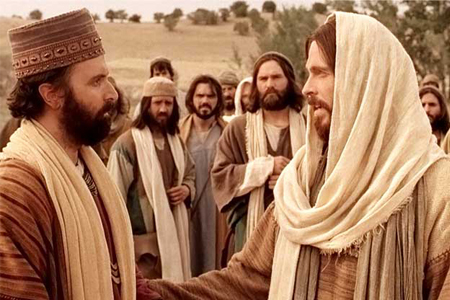Jesus was setting out on a journey when a man ran up, knelt before him and put this question to him, ‘Good master, what must I do to inherit eternal life?’ Jesus said to him, ‘Why do you call me good? No one is good but God alone. You know the commandments: You must not kill; you must not commit adultery; you must not steal; you must not bring false witness; you must not defraud; you must honour your father and mother.’ And he said to him, ‘Master, I have kept all these from my earliest days.’ Jesus looked steadily at him and loved him, and he said, ‘There is one thing you lack. Go and sell everything you own and give the money to the poor, and you will have treasure in heaven; then come, follow me.’ But his face fell at these words and he went away sad, for he was a man of great wealth.
Jesus looked around and said to the disciples, ‘How hard it is for those who have riches to enter the Kingdom of God!’ The disciples were astounded by these words, but Jesus insisted, ‘My children’, he said to them, ‘how hard it is to enter the Kingdom of God! It is easier for a camel to pass through the eye of a needle than for a rich man to enter the Kingdom of God.’ They were more astonished than ever. ‘In that case,’ they said to one another, ‘who can be saved?’ Jesus gazed at them. ‘For men,’ he said, ‘it is impossible, but not for God: because everything is possible for God.’ (Mark 10:17-27)
Reflection - Nothing is impossible for God
In the Jewish tradition, wealth was seen as a blessing from God and the wealthy person as especially favoured by God. Along with the idea of divine blessing and favour came a divine obligation (often ignored) – the care of God’s poor.
As the conversation between the rich man and Jesus unfolds, we see that he a good and upright man. The commandments which Jesus spells out are those to do with one’s treatment of others. These, the rich man says, he has always kept.
Jesus’ love and affection for the man recognises his very genuine efforts to live according to the commandments. This love ushers in the call to discipleship: ‘There is one thing you lack. Go and sell everything you own and give the money to the poor, and you will have treasure in heaven; then come, follow me.’ Jesus wants this man to be a follower of his. He is inviting him to move from a way of life centred on the Torah (Jewish law) to a way of life centred totally on Jesus.
When the man first approaches Jesus he asks what more he must do to inherit eternal life while still maintaining the present direction of his life. What Jesus is inviting him into is the total transformation of his life – to go in a new direction. Jesus is inviting him to an even more radical fulfilment of his obligations to neighbour by selling all he has, giving the proceeds to the poor, and then becoming a follower of Jesus.
Rather sadly, the rich man cannot take this step. He is trapped and controlled by his possessions and cannot let them go in order to enter into joyful and life-giving companionship with Jesus.
When Jesus talks about how hard it is for a rich person to enter the kingdom of God the disciples are astounded. They, too, think of wealth and possessions as a sign of God’s favour and blessing. Jesus drives home his point by insisting that, ‘It is easier for a camel to pass through the eye of a needle than for a rich man to enter the kingdom of God.’ The disciples are even more astounded and conclude that if rich people can’t make it into the kingdom, then what hope do the rest of us have?
Jesus’ reply to the disciples tells us clearly that if we rely on human resources and means it is impossible to find salvation. But if we rely on God, then we can be saved - the good and gracious God who gives the Kingdom as pure, unmerited gift.
Sometimes, the very things we love, in which we find our security and in which we place our trust can turn out to be our undoing and stumbling blocks on our journey into the kingdom.
Jesus’ reply about God who can do the impossible is also a reassurance that God stands ready to journey with us, to help us find the way to move our hearts from reliance on ourselves and human resources to rely on God’s love and companionship.
You can download and print our prayers and reflections for this Sunday.
pdf
Celebrating At Home 28th Sunday of Ordinary Time [PDF]
default
Celebrating At Home 28th Sunday of Ordinary Time [ePub]















